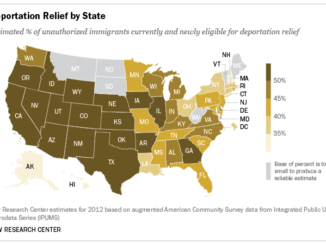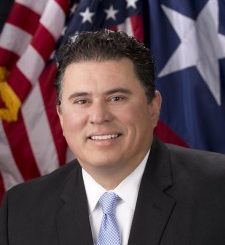
by Bruce Ackerman
If he did, and used soldiers to build it, they would all be committing a federal crime
President Trump on Friday said that he was considering the declaration of a “national emergency” along the border with Mexico, which he apparently believes would allow him to divert funds from the military budget to pay for a wall, and to use military personnel to build it.
While it is hard to know exactly what the president has in mind, or whether he has any conception about what it would entail, one thing is clear: Not only would such an action be illegal, but if members of the armed forces obeyed his command, they would be committing a federal crime.
Begin with the basics. From the founding onward, the American constitutional tradition has profoundly opposed the president’s use of the military to enforce domestic law. A key provision, rooted in an 1878 statute and added to the law in 1956, declares that whoever “willfully uses any part of the Army or the Air Force” to execute a law domestically “shall be fined under this title or imprisoned not more than two years” — except when “expressly authorized by the Constitution or Act of Congress.”
Another provision, grounded in a statute from 1807 and added to the law in 1981, requires the secretary of defense to “ensure that any activity (including the provision of any equipment or facility or the assignment or detail of any personnel)” must “not include or permit direct participation by a member of the Army, Navy, Air Force, or Marine Corps in a search, seizure, arrest, or other similar activity unless participation in such activity by such member is otherwise authorized by law.”
In response to the Hurricane Katrina disaster in New Orleans, Congress created an express exception to the rules, and authorized the military to play a backup role in “major public emergencies.” But in 2008 Congress and President Bush repealed this sweeping exception. Is President Trump aware of this express repudiation of the power which he is threatening to invoke?
The statute books do contain a series of carefully crafted exceptions to the general rule. Most relevantly, Congress has granted the Coast Guard broad powers to enforce the law within the domestic waters of the United States. But there is no similar provision granting the other military services a comparable power to “search, seize and arrest” along the Mexican border. Given Congress’s decision of 2008, this silence speaks louder than words. Similarly, the current military appropriations bill fails to exempt military professionals from criminal punishment for violating the law in their use of available funds.
It is, I suppose, possible to imagine a situation in which the president might take advantage of the most recent exception, enacted in 2011, which authorized the military detention of suspected terrorists associated with Al Qaeda or the Taliban. But despite President Trump’s unsupported claims about “terrorists” trying to cross the border, it is an unconscionable stretch to use this proviso to support using the military for operations against the desperate refugees from Central America seeking asylum in our country.
It is even less plausible for the president to suspend these restrictions under the National Emergencies Act of 1976. From the Great Depression through the Cold War, presidents systematically abused emergency powers granted them by Congress in some 470 statutes, culminating in the Watergate fiasco. In response, the first section of the 1976 act terminated all existing emergencies and created a framework of checks and balances on the president’s arbitrary will.
If President Trump declared an emergency, Section Five of the act gives the House of Representatives the right to repudiate it immediately, then pass their resolution to the Senate — which is explicitly required to conduct a floor vote within 15 days. Since President Trump’s “emergency” declaration would be a direct response to his failure to convince Congress that national security requires his wall, it is hard to believe that a majority of the Senate, if forced to vote, would accept his show of contempt for their authority.
The Supreme Court’s 1953 decision in Youngstown v. Sawyer would be critical in Congressional consideration of such a decision. In a canonical opinion by Justice Robert Jackson, the court invalidated President Truman’s attempt in 1952 to use his powers as commander in chief to nationalize steel mills in the face of labor strikes. The decision imposed fundamental constitutional limits on the president’s power to claim that a national emergency — in this case, the Korean War — allowed him to override express provisions preventing him from using those powers domestically.
The law is clear; how it would play out is less so. But undoubtedly, we would see a period of passionate debate on Capitol Hill, with scores of representatives, from both parties, condemning the president’s move as an unconstitutional abuse of his powers as commander in chief.
This would play out in public, with millions of service members watching closely. They would immediately be obliged to decide whether to obey President Trump — and risk criminal punishment. For the president to put these men and women in such a position, simply out of petulance over congressional opposition, would be especially unconscionable.
Should the president proceed, he should ask the Office of Legal Counsel to issue an opinion explaining to service members why they would not be “willfully” acting illegally if they heeded the president’s command. But we know this president well enough to know that will not happen.
Instead, he will likely take the most irresponsible path possible, issuing his “national emergency” through a tweet or a question-begging written pronunciamento. Recall how legally flawed his first stabs at the so-called travel ban were; if anything, his willingness to seek legal advice, and the ability of those around him to provide it, has declined since then.
What this all adds up to is a potential crisis much graver than whatever immigration emergencies the president has in mind: A legally ignorant president forcing our troops to choose between his commands and the rule of law in a petty political struggle over a domestic political question.
Bruce Ackerman is a professor of law at Yale and author of “The Decline and Fall of the American Republic.”



